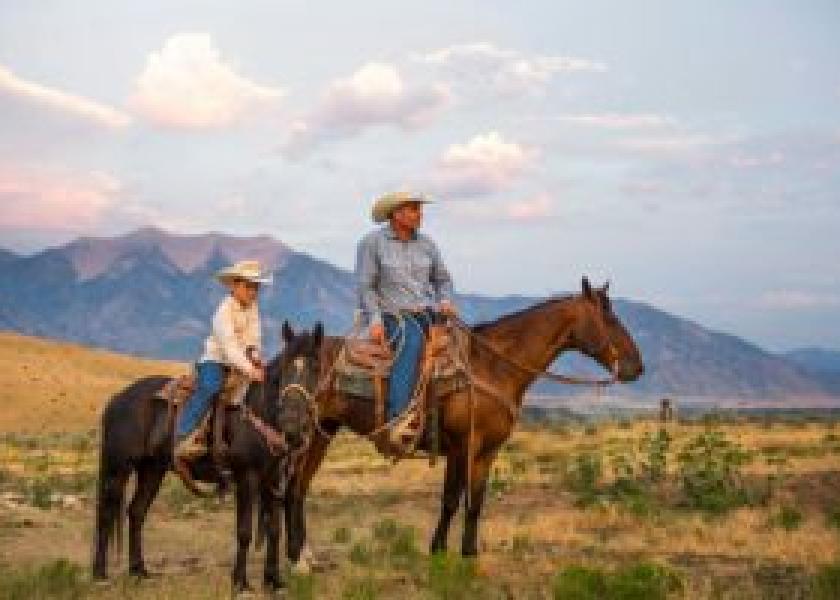CSU Launches Graduate Certificate in Agritourism Management

By Wes White, Colorado State University
Colorado State University has launched the nation’s first online Graduate Certificate in Agritourism Management, equipping tourism operators and agricultural professionals with the skills and strategies to manage new tourism enterprises in traditional settings.
With the global market size of agritourism expected to reach $10.16 billion by 2024 according to Verified Market Reports, the new certificate provides the foundation for creating and operating tourism enterprises.
These new enterprises could include adding a new source of income to an existing farm or ranch, providing exceptional experiences for guests or creating unique opportunities for visitors to immerse themselves in the rural landscape and lifestyle.
Beyond farm-based activities, communities and community development workers in rural areas can benefit from rethinking how to grow tourism in their areas, with a focus on food and agriculture. U.S.-based agritourism revenues topped $2 billion in 2012and grew by 24 percent, making it one of the fastest growing tourism sectors in the country.
“Agritourism can play an important role in the sustainability of small, family farms,” Delta County Tourism Coordinator Kelli Hepler said. “In Colorado, the average reported income from adding agritourism is $36,000 per year.”
Breaking ground
The Graduate Certificate in Agritourism Management is a collaborative effort between the Departments of Agricultural and Resource Economics and the Human Dimensions of Natural Resources. The bulk of the certificate’s curriculum draws on decades of experience from experts in ag-extension courses and includes coursework from the award-winning Master of Tourism Management curriculum at CSU.
The program covers the basics of creating and operating a tourism enterprise in a rural or farm and ranch setting, as well as offering insight into spatial and financial analysis tools, lodging operations, marketing, operating culinary tourism venues and analyzing the latest trends in rural and agricultural tourism development. The coursework is based on input within the tourism industry and the agricultural community and will help students to create strong networks of like-minded entrepreneurs on a global basis.
“Colorado is at the intersection of how tourism and agriculture can be blended to attract those interested in reconnecting with their food, Western heritage or our abundant natural resources, said Rebecca Hill, a research scientist in the College of Agricultural Sciences and an instructor in the program. “This certificate highlights best practices for people to do so effectively.”
As a land-grant institution, CSU has long been a champion of agricultural and food producers, and the rural communities in which they are a vital economic driver.
“Tourism is a strong and growing industry, particularly in Colorado,” said Dawn Thilmany, a professor in the College of Agricultural Sciences who has managed research and outreach in agritourism — before it was known by that name — for over a decade. “Yet, we have too few educational and professional development opportunities for those who want to thoughtfully and authentically integrate agritourism into their farm or community’s development plans. We believe these needs are even more acute in rural areas struggling to find an economic driver well suited to the 21stcentury.”
Hepler noted that many farmers can’t afford to keep working the land, yet the public needs local farms and the farms need more public support. “Agritourism accomplishes both, while supporting the community, enriching wildlife habitat, and protecting water and soil resources.”
Delivery
Delivered by CSU Online, this six-course certificate addresses a need for graduate-level education in a growing tourism sector, as farmers increasingly use agritourism operations as a means to diversify and generate revenues for their agricultural business ventures. The aim of this graduate certificate is to provide students with a sound understanding of the agritourism industry and the knowledge to successfully support a range of agritourism activities.
Students and professionals interested in this program can take courses individually or as a fulfillment of the requirements for the certificate.
Experts in the field
The Department of Agricultural and Resource Economics, which aims to improve societal well-being by creating and sharing tools and information aimed to solve economic, managerial, educational, and policy-related problems within agri-food and resource systems,has offered an undergraduate degree in Agribusiness Management that complements this graduate certificate for over a decade.
The Department of Human Dimensions of Natural Resources has more than 90 years of experience teaching and collaborating with diverse public organizations and people working in nature-based tourism. Its Master of Tourism Management, available online and on-campus, is affiliated with the World Tourism Association, the United Nations agency responsible for the promotion of responsible, sustainable and universally accessible tourism. The department also offers an online Graduate Certificate in Ski Area Management, an online Graduate Certificate in Adventure Tourism and an undergraduate tourism degree with concentrations in global and natural resource tourism (available online and on-campus).







